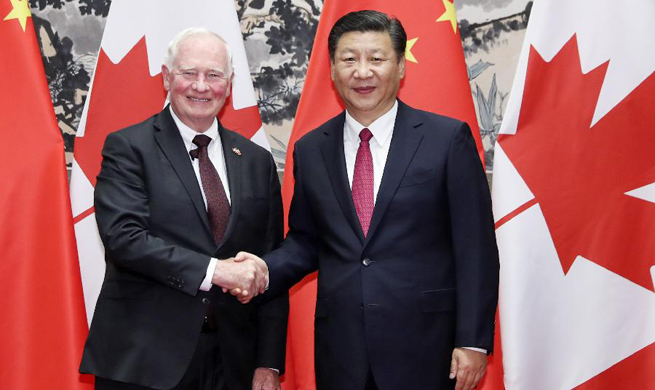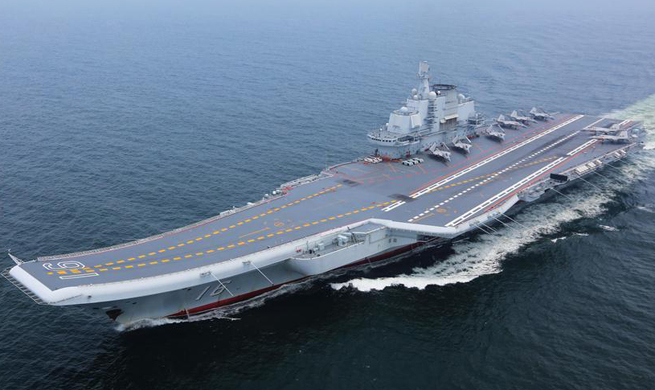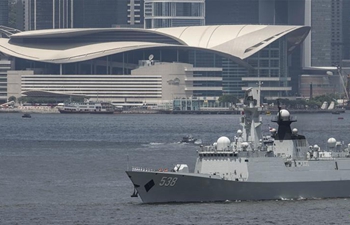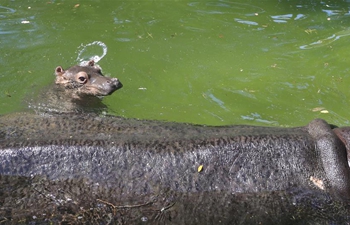PARIS, July 14 (Xinhua) -- "The friendship between our two nations and ourselves is unbreakable," visiting U.S. President Donald Trump said Thursday after talks with his French counterpart Emmanuel Macron.
Macron, for his part, said Washington remained Paris's "strategic ally," despite "strong disagreement" over climate change.
"Something could happen with respect to the Paris accord, let's see what happens," said Trump, indicating a possible change in his stance on the Paris accord, which he withdrew from a month ago.
"We will talk about that over the coming period of time and if it happens, that will be wonderful, and if it doesn't, that'll be okay too," he added.
SEEKING COMMON GROUND AMID DIFFERENCES
While the two leaders put the climate and trade divides to one side for the moment, they highlighted their shared determination to find more in common such as efforts to counter terrorism in Middle East and negotiate a ceasefire in Syria.
The U.S. head of state, who is on his third trip to Europe since taking office, arrived in Paris Thursday morning for Bastille Day celebrations, in a diplomatic move to soften divergence with France by seeking common ground on security and fight against terrorism.
"There are a lot of issues on which France and the Untied States are engaged, some very much in agreement, notably, fighting terrorism," said Jean-Thomas Lesueur, a French analyst of French and European politics.
"But the great divergence is the climate obviously. There is no question about that for now," he added.
Trump pulled out of the Paris climate deal in early June, triggering widespread condemnation by its old allies in Europe including Germany and France.
Last week when taking part in the annual summit of the Group of 20 (G20) in Hamburg, Trump reiterated his position to ditch the Paris Agreement while the rest of G20 members pledged their efforts to support the climate deal.
Meanwhile, embracing a trade protectionist stance, Trump has pursued a more isolationist stand as part of his "America First" doctrine.
A joint declaration adopted by the G20 leaders recognized the "role of legitimate trade defense instruments," which was widely seen as a concession to Trump's administration.
TRUMP'S EUROPE POLICY STILL DEVELOPING
"There was a lot of apprehension about Trump's visit to Hamburg for the G20 meeting, firstly with the anti-capitalist protest and the protests against Trump, especially for some of the stances he has taken on different issues," said Professor Todd Landman, a pro-vice-chancellor at the faculty of social sciences, University of Nottingham.
"He is challenging pre-conceptions and tearing up long-standing alliances," said the professor.
"Trump wants to be different and wants to start again, separating himself from those old alliances as part of his mission to 'Make America Great Again,'" said Landman.
"The Trump administration's policies towards Europe are still forming. President Trump seems to be moving from what you could call a more nationalistic and populist foreign policy to something that is more mainstream," said Charles Kupchan, a senior fellow at the Council of Foreign Relations, a New York-based think tank.
In May, Trump used the occasion of his maiden summit with leaders of the North Atlantic Treaty Organization (NATO) leaders to, once again, remind his fellow NATO alliance leaders of being not "fair" to U.S. taxpayers and demand the bloc members increase their military spending.
Trump had previously supported Britain's shock Brexit vote, claimed the European Union (EU) was a doomed would-be superstate and dubbed NATO "obsolete," casting shadows on the relations between Washington and Europe.
However, later, Trump publicly committed himself for the first time to the NATO charter's Article 5 on mutual defense.
"And certainly we are there to protect, and that's one of the reasons that I want people to make sure we have a very, very strong force by paying the kind of money necessary to have that force," Trump said.
FUTURE DEVELOPMENT OF U.S.-EUROPEAN RELATIONS
Although Trump may have soured relationships with old allies from across the Atlantic Ocean, he will be aware that just as Europe needs the United States, the United States needs Europe, Landman said.
"U.S. engagement and support for building the institutions of modern Europe have helped that continent enjoy an unparalleled period of peace and stability," said Steven Pifer, a senior fellow at the Brookings Institution, a Washington-based think tank.
The institutions include the EU, NATO, the Organization for Economic Cooperation and Development and the Organization for Security and Cooperation in Europe.
"Some analysts say we are at a pivot point in U.S.-European relations," Pifer noted.
"I think the challenge for the administration remains to articulate a positive vision of its foreign policy that is able to mobilize international support across the economic, political and security realms," said Jeffrey Rathke, a senior fellow with Center for Strategic and International Studies, a Washington-based think tank.
"He (Trump) has already gone from calling NATO obsolete to being a supporter of NATO," Kupchan said, adding: "The next big question is, will he go from being a skeptic of the EU to being a supporter of the project of the European integration."
If Trump makes those changes - being supportive of NATO and the EU, there will be a basis for a continuation of a strong transatlantic partnership, Kupchan added.

















